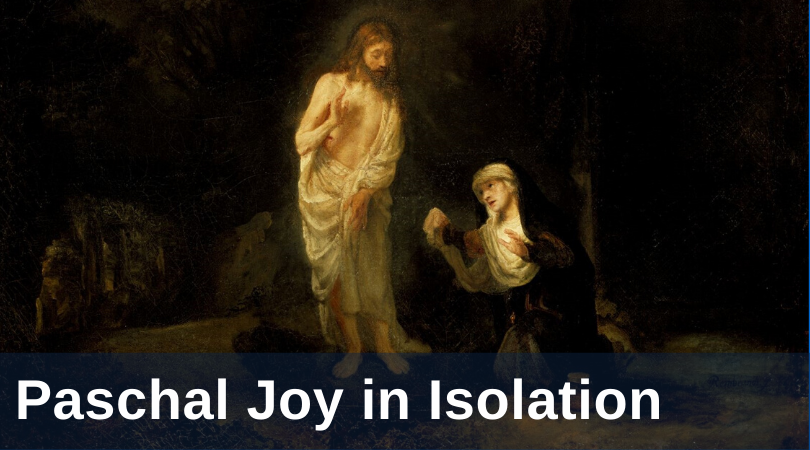
“Lord, I believe that You are present in the Most Holy Sacrament. . . .
Since I cannot at this moment receive You sacramentally, come at least spiritually into my heart.”
—from the Act of Spiritual Communion
Despite the consolation the Act of Spiritual Communion offers the Church during this time of virtual Mass and assembly, the prayer simultaneously elicits a deep sense of loss. Its supplication wells from the sorrowful confession that precedes it, in which we plainly acknowledge our inability to physically receive the Eucharist—the Body of Christ in whom and from whom the Church receives her truest identity. With the concluding line, we plead with Jesus, “never permit me to be separated from You”; yet it seems that we already have been separated from him, and that the timing couldn’t be worse. Amid the chaos of disease and death, we experience ourselves as cut off from the very source and summit of our life. We ask, “Why, O Lord, have you forsaken your beloved in this critical hour? How do we reconcile your apparent disappearance with our unchanging dependence on you? Is it possible to partake joyfully in the Paschal Mystery while unable to receive Communion as we have in the past?”
Christ responds to our cry with gentle reminders and a bold invitation. Tenderly, compassionately, he first reminds us that he knows our pain, which he experienced to its utmost depth on the Cross. He, too, was submerged in the darkness of death and chaos, and he himself cried out, “My God, my God, why have You forsaken me?” (Matthew 27:46; Psalm 22:2). And so, Jesus remains close. In fact, having freely submitted to abandonment, he has created a beautiful paradox: he has transformed the very experience of his absence into an experience of his presence, an intimate means of sharing in his life. By lifting up those human words of forsakenness to the Father, he claimed them as his own so that, in repeating his expression, our words and reality are no longer ours. Rather, they become designated as his.
Of course, Christ’s forsakenness and death on the Cross do not mark the conclusion of his intimacy with us, but the opening of a new and fuller communion. Having shared in our humanity, he has given us the totality of his life. We are further incorporated into his passing-over (his Pasch) through death into the fullness of the Resurrection. In view of the whole arc of his Paschal Mystery, we can begin to recognize the hope embedded in Christ’s itinerant pattern of goings and comings, departures and returns. Speaking directly into our pain, he assures us: “It is expedient for you that I go away: for if I go away, the Comforter will not come unto you; but if I depart, I will send him unto you” (John 16:7). The full meaning of this message is unveiled in the Ascension, wherein Christ reveals that his departure is not a loss, but an intentional going away for the sake of establishing fuller communion with us. Evading our grasp, he rebuffs our old, limited form of knowing him that we might encounter him anew, that he might be unremittingly and universally present. That he might revive every facet of our being.
How, then, is our Eucharistic Lord making himself newly present here and now to us, the Church, during our homebound separation? What are those dark corners in our lives that he desires to incorporate more fully into his Body, into Communion? Returning to the virtual Mass, he offers us a precise invitation as we confess and supplicate, “Lord, I am not worthy that You should enter under my roof, but only say the word and my soul shall be healed.” Never in our memory have these words been so literal. As we utter them under the roofs of our homes, we return to their original Gospel meaning and there discern Christ’s movement: knocking at the door, he begs that we welcome him into our homes. As we are unable to pilgrim to our parish sanctuaries, he wishes for us to realize our membership in his Body at the most foundational and familiar level, to become more perfectly the Domestic Church. He desires to draw us into himself and heal us. Now he is the one who pleads, begging that we not waste this opportunity: Please, let me permeate your homes, your families. Conform your bodies to mine through your daily sacrifices and charitable gestures, little mundane deaths to self. Let me use the ordinary material of your lives so that you might perceive the entire arc of your human existence as Eucharistic, as bodying-forth my presence to your spouse, children, parents, siblings.
To be sure, this intimate incorporation from home will not eliminate our hunger for physical Communion at Mass; rather, it will purify our longing and prepare us for a fuller reunion with Christ’s Body. When that blessed day finally arrives, we will be able to respond to his total self-gift with greater reciprocity, for our lives will have been made more integrally his.
Like what you read? Submit your email below to have our newest blogs delivered directly to your inbox each week.
Featured image: Rembrandt van Rijn, Christ Appearing to Mary Magdalene, "Noli me tangere" (1651); public domain.


